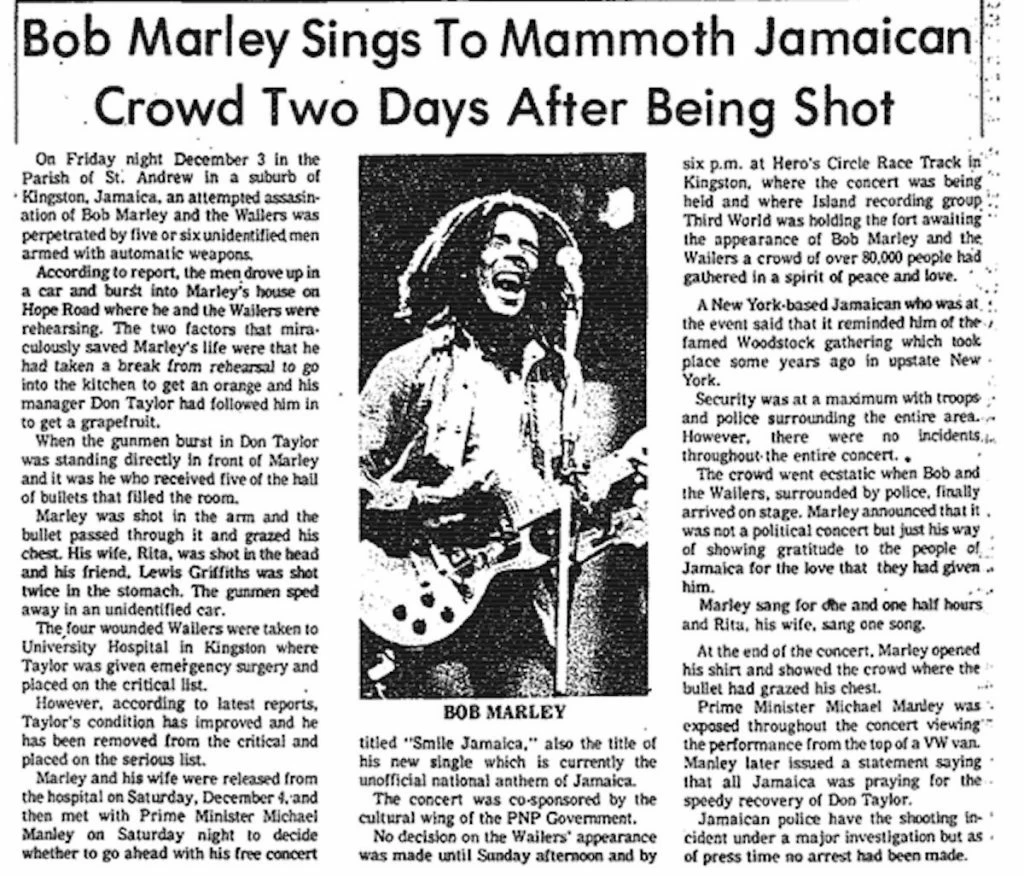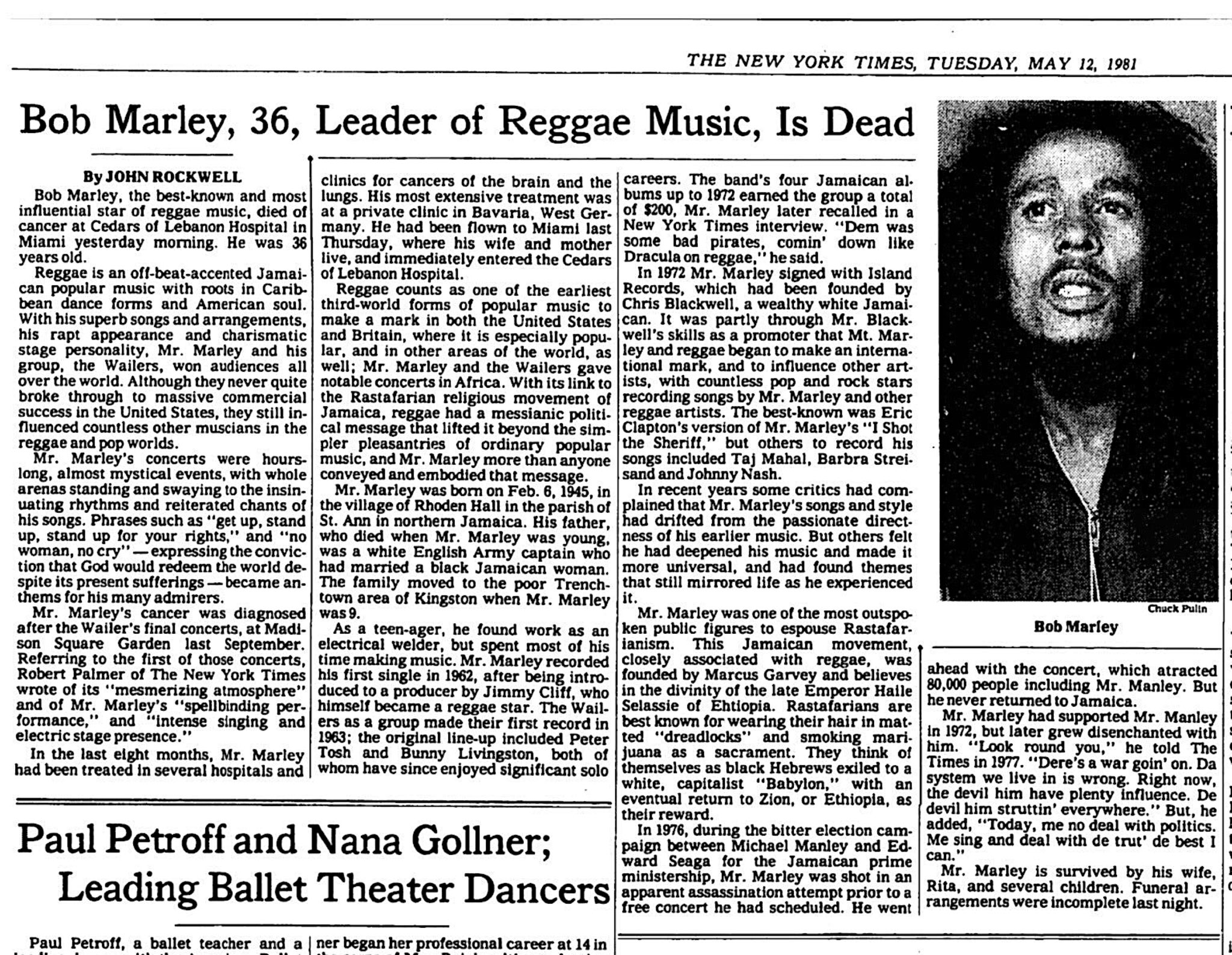Bob Marley Death Reason: Unveiling The Truth Behind A Legend's Passing
When we talk about music legends, Bob Marley stands out as a cultural icon who left an indelible mark on the world. His music transcended borders, and his message of peace and love continues to resonate with people across the globe. But what really happened that led to his untimely death? Let's dive into the details, uncover the truth, and honor the man who changed the game forever.
Bob Marley, the reggae king, is more than just a musician. He’s a symbol of resistance, love, and unity. His music spoke to the soul, and his lyrics still echo in our hearts. However, his life was tragically cut short, leaving fans and followers around the world in shock and mourning. Today, we’re going to explore the reasons behind his death and what we can learn from it.
Before we get into the nitty-gritty, it’s important to remember that Bob Marley wasn’t just another artist. He was a spiritual guide, a revolutionary, and a beacon of hope for many. His death wasn’t just about losing a musician; it was about losing a cultural leader who inspired millions. Let’s take a closer look at the events that led to his passing and how it impacted the world.
Read also:Bollyflix Your Ultimate Destination For Bollywood Entertainment
Table of Contents
- Bob Marley Biography
- Early Life and Career
- Health Issues That Plagued Him
- The Diagnosis That Changed Everything
- His Battle with Cancer
- Bob Marley Death Reason
- The Legacy He Left Behind
- Impact on the Music Industry
- Tributes and Memorials
- Conclusion and Reflections
Bob Marley Biography
Let’s start with the basics. Bob Marley, whose full name is Nesta Robert Marley, was born on February 6, 1945, in Nine Mile, Saint Ann Parish, Jamaica. He grew up in a world where music was more than just entertainment—it was a way of life. His journey from a humble beginning to becoming a global icon is nothing short of inspiring.
Key Facts About Bob Marley
| Full Name | Nesta Robert Marley |
|---|---|
| Date of Birth | February 6, 1945 |
| Place of Birth | Nine Mile, Saint Ann Parish, Jamaica |
| Date of Death | May 11, 1981 |
| Cause of Death | Acral Lentiginous Melanoma |
Bob Marley wasn’t just a musician; he was a philosopher, a poet, and a revolutionary. His music was a reflection of his beliefs and values, and it touched the hearts of millions. Now, let’s dive into his early life and career to understand what made him the legend he is today.
Early Life and Career
Bob Marley’s early life was filled with challenges, but he never let those obstacles define him. Growing up in Jamaica, he was exposed to the struggles of poverty and inequality. These experiences shaped his worldview and became the foundation of his music.
His career began in the early 1960s when he formed the band The Wailers with Peter Tosh and Bunny Wailer. Together, they created some of the most iconic reggae music of all time. Songs like “No Woman, No Cry” and “Get Up, Stand Up” became anthems for a generation seeking change and justice.
But it wasn’t all smooth sailing. The Wailers faced numerous challenges, including financial struggles and internal conflicts. Despite these hurdles, Bob Marley’s determination and passion kept the band moving forward. His music was more than just entertainment—it was a call to action for social and political change.
Health Issues That Plagued Him
As much as Bob Marley’s music inspired millions, his health issues were a constant battle. It all started with a small sore on his toe, which he initially dismissed as a minor injury. But as time went on, the sore didn’t heal, and it became a source of concern.
Read also:Camilla Araujo Erome Unveiling The Star Beyond The Spotlight
Bob Marley was known for his love of soccer, and he often played barefoot. Many believe that the injury was caused by a soccer game, but the truth is more complex. The sore turned out to be a symptom of a much more serious condition—acral lentiginous melanoma, a rare form of skin cancer.
Despite the diagnosis, Bob Marley refused to have his toe amputated, citing his Rastafarian beliefs. This decision would ultimately have a profound impact on his life and legacy.
The Diagnosis That Changed Everything
In 1977, Bob Marley was officially diagnosed with acral lentiginous melanoma. This type of cancer is rare and often affects people of color. It’s a devastating diagnosis, but Bob Marley remained optimistic and continued to pursue his passion for music.
At the time, the medical community was still learning about this specific type of cancer. Treatment options were limited, and the prognosis was grim. Despite the challenges, Bob Marley refused to let his illness define him. He continued to perform and record music, using his platform to spread messages of love and unity.
But the cancer was relentless, and it eventually spread to other parts of his body, including his brain and lungs. This progression would ultimately lead to his untimely death.
His Battle with Cancer
Bob Marley’s battle with cancer was both courageous and heartbreaking. He sought treatment in various countries, including Germany, where he underwent alternative therapies. These treatments were experimental and often controversial, but Bob Marley was determined to fight the disease.
His decision not to have his toe amputated was rooted in his deep spiritual beliefs. As a Rastafarian, he believed that his body was a temple and should remain intact. This belief was a reflection of his faith and his commitment to living life on his own terms.
Despite the treatments, the cancer continued to spread, and Bob Marley’s health deteriorated rapidly. In the final months of his life, he returned to Jamaica, where he passed away on May 11, 1981, at the age of 36.
Bob Marley Death Reason
So, what exactly was the reason behind Bob Marley’s death? The official cause of death was acral lentiginous melanoma, a rare form of skin cancer. This cancer started in a small sore on his toe and eventually spread to other parts of his body.
Many have speculated about the reasons behind his refusal to undergo traditional treatments, such as amputation. Some argue that his Rastafarian beliefs played a significant role, while others point to his desire to remain authentic and true to himself.
Regardless of the reasons, Bob Marley’s death was a profound loss for the world. His music and message continue to inspire millions, and his legacy lives on through the generations.
The Legacy He Left Behind
Bob Marley’s legacy is as powerful today as it was during his lifetime. His music continues to resonate with people from all walks of life, and his message of love and unity remains relevant in a world that often feels divided.
His influence extends beyond music. Bob Marley became a symbol of resistance and change, inspiring countless activists and leaders around the globe. His commitment to social justice and equality is a testament to his enduring impact on the world.
Today, Bob Marley’s music is celebrated in festivals, concerts, and tributes around the world. His legacy is a reminder that even in the face of adversity, we can rise above and make a difference.
Impact on the Music Industry
Bob Marley’s impact on the music industry cannot be overstated. He single-handedly brought reggae music to the global stage, introducing millions to the sounds and rhythms of Jamaica. His music transcended borders and cultures, creating a universal language of love and peace.
Artists from all genres have cited Bob Marley as a major influence on their work. From rock to hip-hop, his impact can be heard in the music of countless musicians. His ability to blend politics with melody set a new standard for what music could achieve.
But Bob Marley’s influence goes beyond just music. He changed the way we think about art and activism, proving that music can be a powerful tool for social change.
Tributes and Memorials
Since his passing, Bob Marley has been honored in countless ways. Memorials, statues, and museums dedicated to his life and work can be found around the world. His hometown of Nine Mile, Jamaica, has become a pilgrimage site for fans and followers.
Every year, fans gather to celebrate his life and music during events like Reggae Month and the Bob Marley Birthday Bash. These celebrations serve as a reminder of the impact he had on the world and the legacy he left behind.
Bob Marley’s music continues to inspire new generations, and his message of love and unity remains as relevant as ever. Through these tributes, his spirit lives on, inspiring millions to make a difference in their own lives and communities.
Conclusion and Reflections
Bob Marley’s death was a tragic loss, but his legacy continues to inspire millions around the world. His music, message, and commitment to social justice have left an indelible mark on the world, and his influence can be felt in every corner of the globe.
As we reflect on his life and work, it’s important to remember the lessons he taught us. Bob Marley showed us that music can be a powerful tool for change, and that even in the face of adversity, we can rise above and make a difference.
So, take a moment to listen to his music, reflect on his message, and consider how you can carry his legacy forward. Share this article with your friends, leave a comment, and let’s keep the conversation going. Bob Marley may be gone, but his spirit lives on through us all.
And remember, love, peace, and unity are more important now than ever before. Keep the vibe alive, and let’s honor Bob Marley’s memory by making the world a better place.


